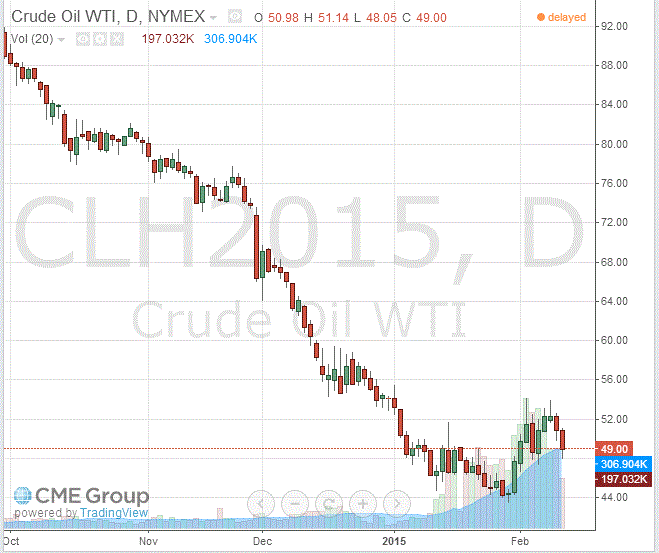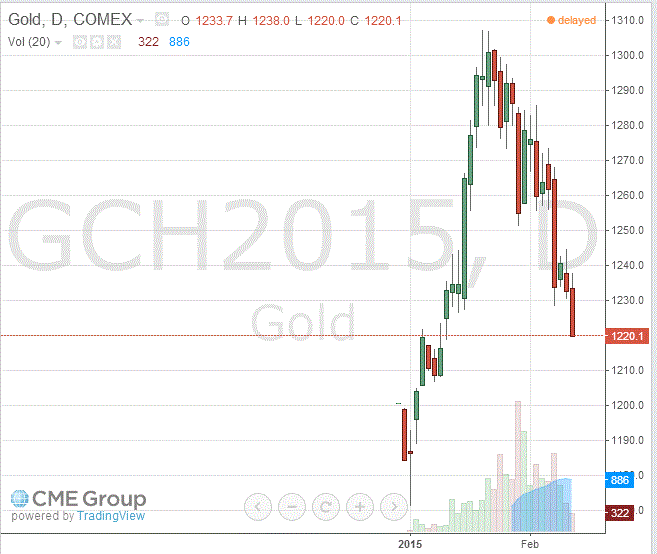Noticias del mercado
-
17:40
Oil: a review of the market situation
Oil prices fell markedly, while dropping below $ 55 (Brent) and $ 49 (WTI), which was associated with the publication of data on stocks of petroleum products in the United States. The Department of Energy has stated that during the week from 31 January to 6 February crude oil reserves rose by 4.9 million barrels to 417.9 million barrels, while the average forecast assumes an increase of 4 million barrels. It is worth emphasizing reserves reached a historical high for the entire period of reference of the statistics (since August 1982). Oil reserves in Cushing terminal rose by 1.2 million barrels to 42.6 million barrels, the highest value for the half year. Distillate stocks fell by 3.3 million barrels to 131.2 million barrels, while analysts had expected a decline of 1.3 million barrels. Gasoline inventories rose by 2.0 million barrels to 242.6 million barrels. Analysts had expected an increase of 200 thousand .. refining capacity utilization rate increased by 0.1% to 90%. Expected to decline by 0.1%.
As investors continue to analyze the report from the US Energy Information Administration (EIA). As it became known, EIA has kept oil production forecast in the country in 2015-2016, contrary to expectations that production will decline because of falling world prices. According to the calculations EIA, this year the average daily production will be 9.3 million barrels, and in 2016 - 9.52 million. In January forecasted production management in the amount of 9.31 million and 9.53 million barrels, respectively. In January, the average daily production was 9.2 million barrels per day, according to a monthly report of EIA. "The volume of oil reserves in the industrialized countries, is expected to be a record at the end of this year, as world oil production is growing faster than demand for fuel," - wrote the head of the IEA report Adam Sieminski. Management raised its forecast for growth in world oil demand this year by 10,000 bpd to 1.01 million and lowered the forecast for 2016 by 20,000 bpd to 1.01 million.
Meanwhile, today, Barclays Capital analysts said that the recent rise in oil prices, as a result of which that has risen by about $ 10 per barrel, will not be sustainable, and soon the price will start to fall again. According to the calculations Reuters technical analyst Wang Tao, Brent could drop below $ 56.21 a barrel, while WTI - below $ 49.88. Analysts Jefferies Bache predict lower prices for both the standard in the near future. "We continue to expect new lows for the WTI and the price falls to $ 40. If this level is reached, the closest reference Brent price will be $ 48", - the report says Jefferies Bache.
March futures price for US light crude oil WTI (Light Sweet Crude Oil) dropped to 49.00 dollars per barrel on the New York Mercantile Exchange.
March futures price for North Sea Brent crude oil mix fell to $ 1.30 to $ 54.95 a barrel on the London Stock Exchange ICE Futures Europe.
-
17:20
Gold: a review of the market situation
Gold prices declined significantly today, reaching at this month low, which was associated with the strengthening of the US dollar across the board. Market participants are also cautious amid uncertainty caused by the situation in Greece and Ukraine.
Since the beginning of February, spot prices fell nearly 4 percent, as a strong dollar and expectations of higher interest rates in the United States put pressure on investor sentiment. Published last week upbeat employment report in the US has forced investors to reconsider the expectations of the first rate rise in June. Expectations rise in interest rates had a negative impact on the dynamics of the price of gold, as the precious metal can not compete with the earning assets with growth rates.
"If you stop buying associated with risk aversion, gold market in the near future will continue to be under pressure. Also, it will affect the Fed's policy, especially if the market decides that the interest rates will be raised in June. Prices are subject to closer to $ 1,200 before the demand will grow enough to stop the fall in prices, "- said HSBC analyst James Steel.
Remember, today held an emergency meeting of the Eurogroup, which is expected to Greece will propose to conclude an interim agreement on the financing of the country. Finance Minister Wolfgang Schaeuble Germany there are no plans to discuss the issue dispelled expectations of a possible conclusion of the Interim Agreement.
In addition to Greece, today the market's attention is also directed to meet Ukrainian President Poroshenko, German Chancellor Merkel, French President Hollande and Russian President Vladimir Putin. Late last night came the news that Obama had a conversation with Putin, during which the US president urged his Russian counterpart, do not miss this week and a chance to find a diplomatic solution to the crisis. US Treasury Liu also said yesterday, "the urgency of early joint decision" and "some progress in this direction in the last few days"
March futures price of gold on the COMEX today fell to 1220.10 dollars per ounce.
-
12:15
Oil: Prices decline as global glut persits
Oil prices declined in today's volatile trading. Yesterday the International Energy Agency stated that prices are likely to fall as stockpiles will increase. Stockpiles help by OPEC-members will reach an all-time high in the middle of 2015. Brent Crude lost -1.31%, currently trading at USD55.69 a barrel. On January 13th Crude hit a low at USD45.19 and began to rise on reports on declining rig numbers in the U.S. and capital expenditure cuts. Crude registered the biggest 2-week gain in 17 years last week. West Texas Intermediate declined by -0.62% currently quoted at USD49.71, below the level of USD50 again. Saudi Arabia, Iraq, Kuwait and Iran - OPEC's four biggest producers in the 12 member club - further cut prices to Asia in a fight for market share. Last week Saudi Arabia cut its prices to the lowest level in 14 years.
Markets wait data on U.S. Crude Oil Inventories due later in the day at 15:30 GMT to assess the strength of demand from the world's largest consumer.
Worldwide supply still exceeds demand in a period of low global economic growth and the OPEC refusing to cut output rates to stabilize prices. Smaller OPEC members want to cut production but the organisation, responsible for 40% of worldwide production focuses on its fight for market share. Rising U.S. stockpiles are contributing to a global glut that drove prices almost 50 percent lower last year. The U.S., Brazil, Russia and the OPEC are producing at record levels.
-
12:00
Gold prices almost flat despite Greek Standoff
Gold is trading almost flat today despite concerns over Greece and the upcoming Eurozone Emergency Meeting. Germany maintained its position that Greece has to comply with the terms of the bailout.
Yesterday Prime Minister Alexis Tsipras won a confidence vote in Greek Parliament on his plan to cancel the international bailout. Hopes for a compromise in Greek debt negotiations lend support to the markets. Reports state that the European Commission could propose a six-month extension to the bailout program. Greece seeks to get a 10 billion euro bridging plan in order to buy time and to avoid a funding crunch but according to German Finance Minister Schäuble there are no plans to give the country more time.
A stronger U.S. dollar and the prospect for higher U.S. rates following last week's robust U.S. jobs report weigh on the precious metal as it is dollar-denominated and not yield-bearing.
The precious metal is currently quoted at USD1,234.30, +0,06% a troy ounce. On Thursday the 22nd of January gold reached a five-month high at USD1,307.40. Gold dropped on February 2nd after U.S. payroll gains.
-
00:39
Commodities. Daily history for Feb 10’2015:
(raw materials / closing price /% change)
Light Crude 50.02 -5.37%
Gold 1,233.70 +0.12%
-


